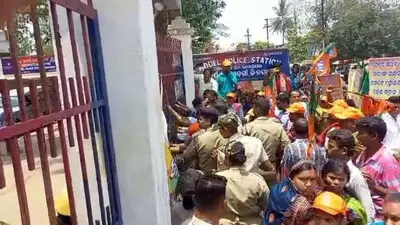Recommended Stories
By Sandeep Sahu
Who drove the Rairangpur lady lecturer to suicide? It was certainly not Soumya Ranjan Sahoo, the man who allegedly raped her and was arrested for it – but only after her death. Had that been the case, she would have committed suicide nearly a month back, soon after she was raped by Sahoo while on a visit to a relative’s place in Keonjhar. Far from contemplating suicide, the brave woman did what anyone in her position should do; go to the police and file a complaint. In fact, she did much more than just file a case. She pursued it vigorously, visiting the Jharpokharia police station every second day to enquire about the progress of the investigation. Even the constant threat of making a video the perpetrator claimed to have made of the act viral did not deter her from seeking justice for herself. She took the extreme step only when all hope of justice ebbed out and she was convinced that the police are determined to let the culprit go scot free. In other words, it was the police that drove her to suicide. In all fairness, therefore, a case under 306 (abetment to suicide) should be registered against the ASI in charge of the case (and maybe against the IIC too) and he should be arrested forthwith. But as we know only too well, that will never happen. A mere suspension – certain to be revoked in a few months’ time once the furore over the case dies down - would do just fine.
Take any recent case where a rape victim has committed suicide and you will find a definite pattern to it. The victim goes to the police to register an FIR, but is ‘counselled’ by the police not to press it. If the victim is poor and the officer uncouth - and there is not dearth of this breed in our police force – he would simply refuse to register the FIR. One of the most frequent alibis used by the police, as was the case in the horrific Hyderabad gang rape case too, is ‘jurisdiction’. This columnist knows of a recent case where the Mahila police station in Bhubaneswar refused to register a complaint by a woman and asked her to go the ‘local’ police station instead! (One wonders where exactly does the jurisdiction’ of the Mahila police station start and end!) If this is the state of affairs in the state capital, just imagine what it would be like in a remote village. And it is not as if the police don’t know about the Supreme Court ruling that allows anyone to register a complaint anywhere. Often, it takes an intervention by a higher up in the police or an influential person, a court order or a gherao of the police station just to get the complaint registered!
If the officer concerned is ‘kind’ enough, he would helpfully dictate the FIR as the IIC, Haridaspur apparently did in the Smitarani Biswal case recently. Or explain to the victim the sheer pointlessness of going ahead with the case and try to broker a ‘compromise’ with the perpetrator. The law is unambiguous in this regard. The police officer simply doesn’t have the option of ‘dictating’ the FIR; he has to accept it as written by the victim or her family member. If the complainant is unlettered, then it is incumbent on the officer to faithfully record what the complainant tells him. Nor is he permitted to broker any ‘deal’ between a wronged woman and the rapist. But as anyone with even a cursory knowledge of how the wheels of justice moves know very well, the police, especially in the hinterland, play by an altogether different law book.
When circumstances beyond their control force him to register, the officer would simply sit on it without doing anything (as the IIC, Jharpokhria allegedly did for nearly a month) in the hope that the victim would throw in the towel at some point. If pressure from the higher-ups or the public leaves him with no option but to act, he would make sure he does such a shoddy job of it that it would never result in conviction. He would not collect the evidence or tamper with it, not pursue the all too obvious leads and not question the right people. This is what a police officer actually told the victim who had gone to the police station to enquire about the progress of the investigation in a case this writer knows personally about. “As per your complaint, I summoned him. But he says he has not done any such thing.” What he left unsaid was; “You are lying.” The idea essentially is to ensure that the perpetrator is not arrested and even if arrested, he is not convicted. No wonder conviction rate in rape cases in Odisha is among the lowest in the country.
Have you ever thought why is it that our cops are almost always on the side of the perpetrator rather than the victim? One doesn’t really have to be a rocket scientist to find the answer. Being on the side of the perpetrator ‘pays’; siding with the victim doesn’t. And the police would not allow any 5T to come in the way.
(DISCLAIMER: This is an opinion piece. The views expressed are the author’s own and have nothing to do with OTV’s charter or views. OTV does not assume any responsibility or liability for the same.)













